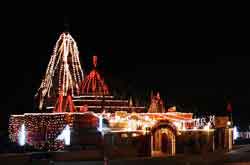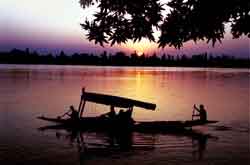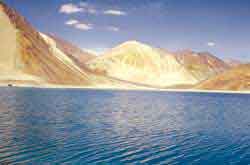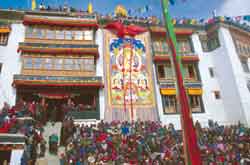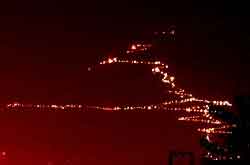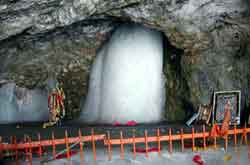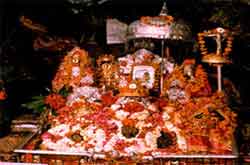Kargil
The western parts of Ladakh comprising the river valleys, which are drained and formed by the Himalayan tributaries of the high Indus, constitute Kargil district. Prominent among these are the spectacular valleys of Suru and Zanskar, which lie nestled along the northern flank of the Great Himalayan wall. The smaller lateral valleys of Drass, Wakha-Mulbek and Chiktan constitute important subsidiaries.
This region formed part of the erstwhile Kingdom of Ladakh. In fact it is believed to be the first to be inhabited by the early colonizers of Ladakh, the Indo-Aryan Mons from across the Great Himalayan range, assorted Dard immigrants from down the Indus and the Gilgit valleys and itinerant nomads from the Tibetan highlands. Also, being contiguous with Baltistan, Kashmir, Kulu etc. these valleys are believed to have served as the initial recipients of successive ethnic and cultural influences emanating from the neighbouring regions. Thus, while the Mons are believed to have introduced north-Indian Buddhism to these valleys, the Dard and Balti immigrants are credited with introducing farming and the Tibetan nomads with the tradition of herding and animal husbandry.
About 15,000 sq. kms. in area, Kargil district has an agrarian population of approximately 120,000 people, who cultivate the land, along the course of the drainage system, wherever artificial irrigation from mountain streams is possible. About 85 % are Muslims, mainly of the Shia sect, Islam having been introduced to the original Buddhist population around the middle of the 16th century by missionaries from Kashmir and Central Asia. Their descendants, locally titled Agha, are mostly religious scholars who continue to hold sway over the population, even as the age-old traditions of Buddhist and animistic origin are discernible in the culture. Many elements of the ancient supernatural belief systems, especially many traditions connected with agricultural practices, are still followed with subdued reverence.
How to Reach Kargil - Taxis of all types, including 4-wheel drive vehicles, can be hired at Srinagar and Leh, for visiting Kargil. J&K State Road Transport Corporation operates regular buses (including deluxe coaches) between Srinagar and Leh/Kargil. Local buses, including mini coaches for Mulbek and Drass, leave Kargil every morning and afternoon.
Sankoo, Panikhar and Parkachik are connected with Kargil by regular bus services. The bus ride from Kargil takes 2 hours to Sankoo, 3 hours to Panikhar and about 4 hours to Parkachik. Rangdum is serviced by the buses proceeding to Padum, which increases in frequency according to demand. Trucks plying on the Kargil - Padum Road also offer a lift, in the cabin, for the price of a bus seat. Car and jeep taxis can be hired from Kargil for visiting different places in the area.
Hotel Stay & other Accomodation
Kargil: Hotel tariff in Kargil has a wide range depending on the quality of accommodation and services offered, which range from barely basic to reasonably comfortable, with attached bath and running hot water. Kargil also has two Tourist Bungalows, which jointly provide suits and furnished rooms with proper catering facilities. Advance reservation can be sought from the tourist office, Kargil. There is also a circuit house with furnished rooms. These can be reserved through the office of Deputy Commissioner, Kargil.
Mulbek/ Shergol: The Tourist Bungalow at Mulbekh, which has attached catering arrangements, provides furnished rooms. Dormitory accommodation at much cheaper price is available with some guest houses attached with the teashops located near Mulbek Chamba. Alternatively, tourists can return to Kargil for the night. The Tourist Bungalow at Shergol also provides fully furnished rooms.
Drass: The Tourist Complex here provides furnished rooms and suites. Advance reservation can be done through the Tourist Office at Kargil or its branch at Drass. Some private hotels also provide rooms equipped with basic necessities.
Suru Valley: At Sankoo, basic accommodation is available in the Govt. Rest House and Tourist Bungalow. At Panikhar the Tourist Bungalow provides furnished rooms, while some private hotels also offer accommodation with basic facilities. There are Trekkers’ Huts, one each at Parkachik and Tangole, providing rooms and a dormitory. At Rangdum, Tourist Complex provides furnished rooms and dormitory accommodation. In addition, local entrepreneurs also establish tented camps during the season where basic accommodation and food are available.
Supplementary Information
Banks: The State Bank of India (with money changing facility) and J&K Bank have a branch each in Kargil.
Communication: Kargil has world wide direct dial telephone facility, besides post and telegraph offices. J&K Tourism operates its own wireless radiophone network, connecting its offices at Kargil, Padum and Leh, with those at Srinagar, Jammu and Delhi. This facility is mainly used to monitor the movement and progress of adventure expeditions in the region and for arranging and coordinating rescue of tourists in distress.
Health: The District Hospital at Kargil is fairly well equipped and staffed with doctors. In addition, there are medical dispensaries at Drass, Mulbek, Trespone, Sankoo, Panikhar and Padum, each headed by a qualified doctor and equipped with basic healthcare paraphernalia.

